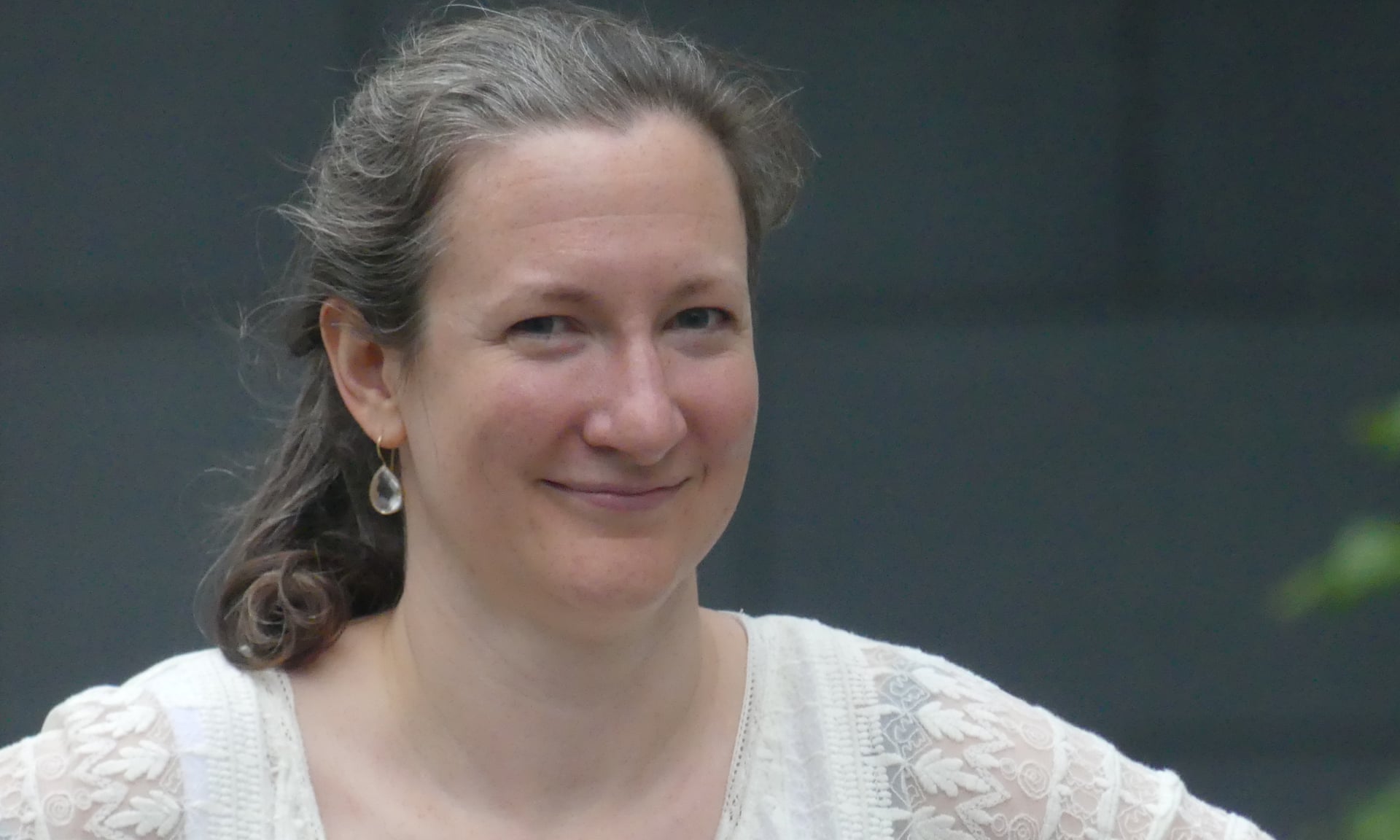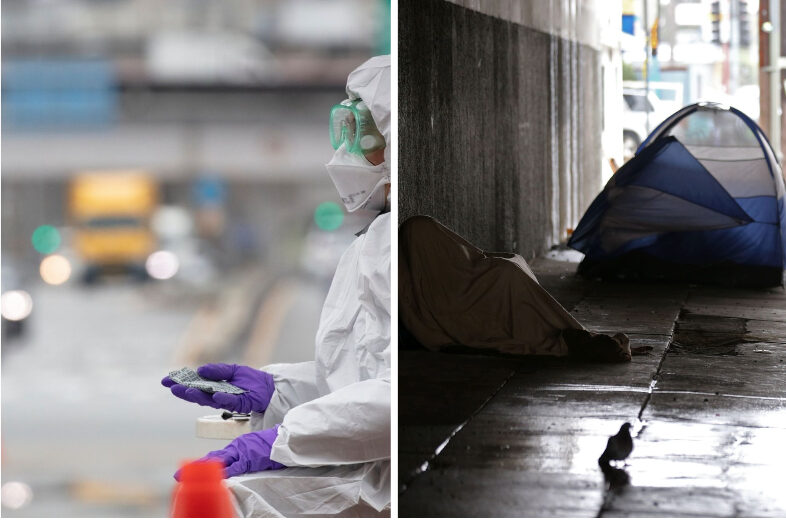Amid the coronavirus pandemic, there’s been a huge amount of talk about staying home. The government and health experts are speaking with one voice: the more we remain at home, isolating ourselves, the better we’ll be able to contain the spread of the virus.
But what about the homeless? In Ireland, where there’s a major homelessness crisis, this is a question that has received surprisingly little air time at a national level – particularly given the potentially deadly ramifications of the virus for those without a place to self-isolate.
Dr Cliona Ní Cheallaigh is well aware of the risks – she’s spent the last number of years developing a programme aiming to make healthcare more accessible to marginalised groups like homeless people. She tells me that in some cases, “they may be in a hostel where there are 12 people in a room or six people in a room. They would all eat together in a big dining room and spend lots of time in enclosed spaces … they cannot cocoon themselves in order to stay away from other people”.
Ní Cheallaigh, an associate professor consultant in Trinity, has been working in St James’s Hospital for almost four years now. As part of the project – the Inclusion Health Integrated Care Programme – a specialist team oversees the homeless people admitted and the patients are then seen on the ward to ensure that their complex needs are met.
“A plan for their discharge is made so that they can receive the care that they need and are looked after when they leave hospital”, says Ní Cheallaigh. “We advocate for them to get housing and to get their needs met and to manage their chronic diseases.”
They may be in a hostel where there are 12 people in a room or six people in a room. They would all eat together and spend lots of time in enclosed spaces
Now, those needs are more urgent than ever, given the heightened risk of the virus for people who are immunocompromised. According to the World Health Organisation (WHO), people of all ages can be infected by coronavirus but older people, and people with pre-existing medical conditions, are more at risk of being infected by the virus and becoming seriously ill.
And the difficulties around self-isolation are just one of the issues faced by homeless people when it comes to the coronavirus.
While many people are busy building up their food supplies – kitchen cupboards are well stocked (sometimes excessively) with foodstuffs – members of the homeless community are at left comparatively empty handed when it comes to building up a defence against the virus. Denied sustenance, immune systems can be weaker, Ní Cheallaigh says – a major issue factor when it comes to managing the risk of picking up an illness.
Ní Cheallaigh’s programme is a vital part of addressing a problem that’s serious enough in normal times, without the threat of a deadly virus. Senator Lynn Ruane, a former president of Trinity College Dublin Students’ Union and a long-time homelessness activist, writes in an email that “living on the streets or in homelessness brings with it a myriad of risks, and now, Covid-19 arrives, and people living in homeless accommodation or rough sleeping have another layer of risk added to every other layer that already existed”.

Dr Cliona Ní Cheallaigh runs a programme aiming to make healthcare more accessible to marginalised groups like homeless people.
While schemes like the Inclusion Health Integrated Care Programme manage the situation as best they can for those who’ve been admitted to hospital, there’s still a massive challenge at the other end of things. As Ní Cheallaigh points out, “their immune systems are often affected by the stress of being homeless, by not having good nutrition, and often they have liver problems, HIV and cancer”.
All of these illnesses, she says, “are much more common in this community, so they are much more susceptible to getting really sick with COVID”.
The heroes in this conversation are the homeless charities that provide safety to those without a solid foundation beneath their feet. Wayne Stanley, the head of policy and communications and the national spokesperson for the Simon Communities, says: “The COVID-19 pandemic has shown that home is the place of safety that we have – it is the foundation of our right to wellbeing, our right to health and it is a place where we can all be safe. To be homeless is to have the absence of that security, of that social foundation.’’
In light of the current situation, both governmental and non-governmental bodies are working to establish and advocate for appropriate support measures for the homeless community.
One of these, SafetyNet (a registered charity funded by the HSE), works alongside Ní Cheallaigh’s Inclusion Health Integrated Care Programme and is currently conducting coronavirus testing on the homeless community. It’s vital work, Ní Cheallaigh says.
The COVID-19 pandemic has shown that home is the place of safety that we have – it is the foundation of our right to wellbeing
“We know that for example, if you don’t know that they have it then they could spread it to a lot more people than the average person who is staying in their own home. They are a very high-risk group so they get priority for testing, which is exactly what they need.”
But for all that’s being done – and the efforts of healthcare and charity workers, which are crucial but don’t often hit the headlines – the outlook isn’t exactly rosy for homeless people.
Rikke Siersbaek is a Trinity Scholar of the Structured Population and Health-Services Research Education (SPHeRE ) – Ireland’s national research training programme for population health and health services. Its work is funded by Ireland’s Health Research Board, and her work takes place in the Centre for Health Policy and Management.
Siersbaek has been researching systematic approaches to improving access to healthcare for homeless people – a field that’s more vital than ever in the current crisis.
She has two key policy recommendations that she says should help the situation – an integrated care approach, and a policy that speaks to the values and characteristics of service providers.
“Healthcare in many countries – including Ireland – can be quite hierarchical”, says Siersbaek. “If you enter that kind of setting as a person when you’re so used to being at the bottom of the hierarchy all the time, you will feel that. There needs to be a really empathic approach, non-judgement, respectful, and a degree of assertive outreach.”
If the person is on substances then they have to be off the substances, then counselling, then the final step is housing. The ‘housing first’ model turns that on its head
“A healthcare system should be presented in a way that is organised around the needs of the patients, is navigable, quick, easy and comfortable. This would be a policy recommendation for the homeless population and for everybody in general – it leads to better outcomes for everybody.”
And at a time when being – and staying – at home is a crucial part of fighting the virus, Siersbaek points to the Finnish model as a way of tackling the issue at its roots. Finland has put in place a “housing first model”, she says, which prioritises housing the homeless as the first step in the process. It’s working: Finland is the only country in the EU that has experienced a decline in homelessness.
In most other countries around Europe, where rates of homelessness continue to rise, Siersbaek says housing comes last on the list: “If the person is on substances then they have to be off the substances, then counselling, then the final step is permanent housing. However, the ‘housing first’ model turns that on its head, and says that the first step is to put the homeless person in a home.”
So as we continue to grapple with an unprecedented crisis in public health – reliant to a large extent on accessible healthcare programmes and the work of charitable organisations – we now have more motivation again to tackle homelessness.
As Ruane says, “if there was ever a time to end homelessness, it is now”.







